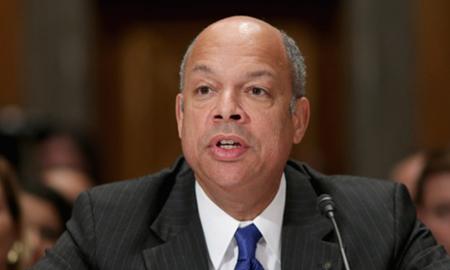On December 23, Jeh Johnson was sworn in as the new head of the Department of Homeland Security (DHS), filling the vacancy created by Janet Napolitano’s departure for the position of president of the University of California system. In the words of DHS, Johnson now leads “the 240,000 dedicated men and women working tirelessly to implement the Department’s important homeland security mission.”
It is a department that is now the third largest within the federal government, one with a budget of approximately $60 billion dollars, about one third of which is dedicated to boundary and immigration policing.
Not surprisingly, there are no indications that Johnson represents a departure from the status quo. Responding to questions f rom various Republican senators in relation to his nomination to lead DHS, Johnson made clear that he supports “common-sense immigration reform,” and deportation of those “who pose a threat to national security and public safety.” He also favors stronger workplace enforcement, including growing the use of E-Verify, an Internet-based system run by the U.S. Department of Homeland Security, which, as DHS describes it, “allows businesses to determine the eligibility of their employees to work in the United States.”
rom various Republican senators in relation to his nomination to lead DHS, Johnson made clear that he supports “common-sense immigration reform,” and deportation of those “who pose a threat to national security and public safety.” He also favors stronger workplace enforcement, including growing the use of E-Verify, an Internet-based system run by the U.S. Department of Homeland Security, which, as DHS describes it, “allows businesses to determine the eligibility of their employees to work in the United States.”
Prior to assuming the DHS helm, Johnson had been the Pentagon’s general counsel during Obama’s first term. In that role he was considered by some to be one of the more liberal members of Obama’s national security team. And, indeed, at his nomination hearing at November, he threw the civil liberties crowd a rhetorical bone. In reference to U.S. Customs and Border Protection’s fleet of 12 drones, he said that DHS needs to be “sensitive to privacy and civil liberties concerns that people who live along those borders have.”
But his broader record provides little reason for hope for a more civil- and human-rights-sensitive Department of Homeland Security. As Medea Benjamin of CodePink and author of Drone Warfare: Killing by Remote Control reminds us, Johnson has defended the NSA’s invasive surveillance program and championed the criminal prosecution of Chelsea Manning and Edward Snowden. He has also voiced hawkish views on U.S. drone strikes abroad, going so far as to defend the assassination of U.S. citizens overseas in a February 2012 speech at Yale Law School.
In addition, Johnson is not immune from making wildly twisted characterizations to suit his narrow ideological goals. As pointed out by Bruce Dixon of the Black Agenda Report, Johnson had the gumption to assert that Martin Luther King–the same man who in 1967 called the U.S. government “the greatest purveyor of violence in the world today” and spoke of the need to combat “the giant triplets of racism, extreme materialism, and militarism”—would have supported the U.S. war in Afghanistan as he “would recognize that we live in a complicated world.” At the same January 2011 Pentagon commemoration of the civil rights icon, Johnson likened the U.S. military’s present-day activities overseas to the work of the Good Samaritan of biblical fame.
Please support our independent reporting. Donate now!
Given such intellectual acrobatics, it’s not hard to imagine Johnson soon saying that the U.S. Border Patrol does the work of Gandhi or St. Francis of Assisi as a way of justifying a ratcheting up of the tools of violence in the policing of the U.S.-Mexico borderlands.
soon saying that the U.S. Border Patrol does the work of Gandhi or St. Francis of Assisi as a way of justifying a ratcheting up of the tools of violence in the policing of the U.S.-Mexico borderlands.
What those new tools could be was revealed this past July by the Electronic Frontier Foundation after it obtained a 2010 DHS report through a FOIA request and learned that U.S. Customs and Border Protection (CBP) recommended arming its drones with “non-lethal weapons designed to immobilize TOIs,” or targets of interest. In response to the EEF, a CBP spokesperson stated that the agency “has no plans to arm its unmanned aircraft systems with nonlethal weapons of any kind.”
Such words are hardly reassuring given the apparent pressures within CBP to weaponize drones, and the fact that the statement ends by noting: “Current Unmanned Aircraft Systems were designed with the ability to add new surveillance capabilities, accommodate technological developments, and ensure that our systems are equipped with the most advanced resources available.”
In other words, all options are open.
This is the agency that Jeh (pronounced “Jay”) Johnson now heads; this is why what is desperately needed is not a new boss, but a radically different system.
Joseph Nevins teaches geography at Vassar College in Poughkeepsie, New York. Among his books are Dying to Live: A Story of U.S. Immigration in an Age of Global Apartheid (City Lights/Open Media, 2008) and Operation Gatekeeper and Beyond: The War on “Illegals” and the Remaking of the U.S.-Mexico Boundary (Routledge, 2010). For more from the Border Wars blog, visit nacla.org/blog/border-wars. Now you can follow it on Twitter @NACLABorderWars.

